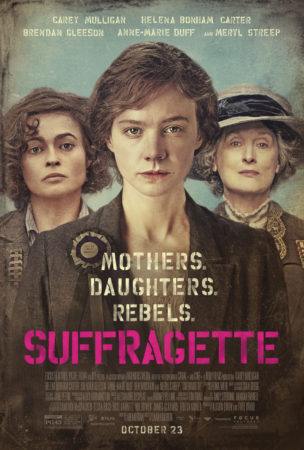We speak to film producer Alison Owen about the filming of Suffragette, dealing with huge stars and raising her daughters, singer Lily Allen and Sarah Owen.

Alison, 54, is a producer who has worked on films such as Elizabeth, Saving Mr Banks and The Other Boleyn Girl. Her latest movie, Suffragette, starring Carey Mulligan, Helena Bonham-Carter and Meryl Streep, has just opened on 15 January.
In 2014 she co-founded the production house Monumental Pictures with fellow producer Debra Hayward. She was previously married to Keith Allen, with whom she has two children – singer Lily Allen, 30, and actor Alfie, 29. Her eldest daughter Sarah, 35, is from a previous relationship. Alison lives in London with her partner of 14 years, Aaron Batterman, an art director.
Everyone felt so passionately about Suffragette – our aim was to show what it was really like to be a working-class supporter of this historic movement in 1910. Meryl Streep – who plays Emmeline Pankhurst – wanted to be a part of the story and spread the message about feminism. Carey Mulligan felt a real empathy and kinship with her character, Maud. We’ve barely seen the suffragettes on screen, apart from in Mary Poppins, where Mrs Banks was rather genteel. The fact that there were these gutsy working-class women, guerrillas of their time, wasn’t recognised at all. There’s a particular scene that had everyone in tears. It was between Carey’s character and her son, Sonny. There was a lot of dispute over whether the scene should be included at all, and our financiers tried to prevent it, but we insisted that it had to be powerful and painful to generate the right response. Even Carey, along with the cast and crew, broke down after we filmed it. There are many reasons why I love what I do, but when something you’ve created can cause such raw emotion, it’s extraordinary.
I’m naturally quite indecisive, but have learnt not to be because making movies is all about quick decisions. As a producer, my job is to get the project going, keep it going by liaising with financiers and the studio, and making it good. On any given day I could be on the phone for 12 hours between LA and London, developing a script, or be on set. Sometimes it doesn’t even matter what the decision is as long as it’s made. It’s like an army – you make a decision and everything starts happening.
I’m adept at dealing with egos. Ego generally stems from anxiety – it’s when passion turns to fear – so I try to make people feel secure, supported and understood. I’m not perfect, though – I sometimes have to apologise for reacting quickly and getting righteous easily.
Raising my daughters, I tried to avoid any gender stereotyping. But no matter how many stories I read to Sarah about the princess rescuing the prince – I’d role-reverse the fairy tales – she’d still be in her Wendy house with a Barbie doll, saying, ‘I’ve got to get this place clean!’ Lily was more of an early feminist. I watch her with her own daughters now – Ethel, four, and Marnie, three – and know she’ll instil strong morals in them.

